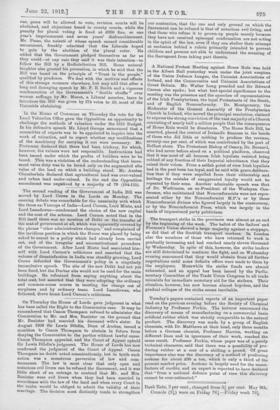The Government's so-called Franchise Reform Bill was introduced in the
Commons on Monday by Mr. J. A. Pease, the Minister for Education, in a speech teeming with unconscious humour. The main features of the measure are the addition of 2,500,000 men and, if the House so wills, of 10i. million women to the register, and the removal of 574,614 votes by the abolition of plural voting and the nine University seats. Qualification is to be by residence or occupation only, and the qualifying period reduced to six months. The age limit is to be twenty-
one, peers will be allowed to vote, revision courts will be abolished, and objections heard in county courts, while the penalty for plural voting is fixed at £200 fine, or one year's imprisonment and seven years' disfranchisement. Mr. Pease, the naivete of whose speech caused considerable amusement, frankly admitted that the Liberals hoped to gain by the abolition of the plural voter. He added that the Government pledged themselves as far as they could—at any rate they said it was their intention—to follow the Bill by a Redistribution Bill. Some natural laughter also greeted hie peroration, in which he said that the Bill was based on the principle of " Trust in the people," qualified by prudence. We deal with the motives and effects of this strange measure elsewhere, but may add that after a long and damaging speech by Mr. F. E. Smith and a vigorous condemnation of the Government's " double shuffle " over woman suffrage by Mr. Mason, a Liberal member, leave to introduce the Bill was given by 274 votes to 50, most of the Unionists abstaining.











































 Previous page
Previous page